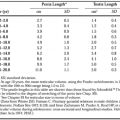DIAGNOSIS
Part of “CHAPTER 99 – PREMENSTRUAL SYNDROME“
HISTORY AND PHYSICAL EXAMINATION
The investigation of PMS begins with a complete history and physical examination. A history detailing past reproductive events and current menstrual cyclicity sets the stage for a more informed discussion about menstrual cycle–related symptoms. Typically, women with PMS report feeling extremely well during past pregnancies. The nature, severity, and chronologic appearance of symptoms in the course of a menstrual cycle
should be determined. Premenstrual manifestations should be distinguished from those involving menstruation, such as dysmenorrhea or menorrhagia, which may be addressed separately. It is extremely important to document the true sense of well-being in the postmenstrual week that most PMS sufferers describe to differentiate this condition from other chronic mood and behavioral disorders that surface under the guise of PMS merely because they show premenstrual exacerbation.
should be determined. Premenstrual manifestations should be distinguished from those involving menstruation, such as dysmenorrhea or menorrhagia, which may be addressed separately. It is extremely important to document the true sense of well-being in the postmenstrual week that most PMS sufferers describe to differentiate this condition from other chronic mood and behavioral disorders that surface under the guise of PMS merely because they show premenstrual exacerbation.
Information should be obtained about the stresses related to the woman’s occupation and family life, because these may significantly affect premenstrual symptoms. Finally, past medical or psychiatric diagnoses and interventions for these should be reviewed. It is important to identify psychiatric illness unrelated to the menses. On the other hand, it is not uncommon for women with PMS to be inappropriately diagnosed as having neurotic depression or manic depressive disorders when the relationship of symptoms to menstruation has been overlooked.
Organic causes of PMS-like symptoms must be ruled out. Marked fatigue may result from anemia, leukemia, hypothyroidism, or diuretic-induced potassium deficiency; headaches may be caused by intracranial lesions. Pelvic examination may reveal tumors of the uterus or ovaries, endometriosis, or pelvic inflammatory disease. Typical menopausal-like hot flashes seen in the premenstrual week in PMS sufferers should not lead to an erroneous diagnosis of menopause.23a
Stay updated, free articles. Join our Telegram channel

Full access? Get Clinical Tree






